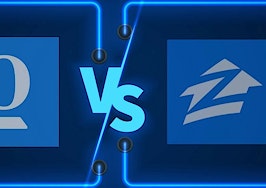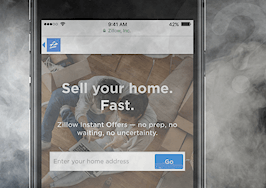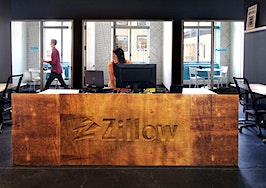Today, Zillow launched a pilot program in two cities — Las Vegas and Orlando, Florida — called “Zillow Instant Offers,” with the promise that a home sale transaction can be completed in as little as a week.
The new Zillow product allows prospective homesellers to receive all-cash offers from a hand-selected group of 15 large private investors along with a side-by-side comparative market analysis (CMA) from a local Zillow Premier Agent.

Zillow Instant Offers mobile view.
Homesellers who accept one of the offers are encouraged by Zillow to use an agent in the process, but they are not required to do so.
Once offers are received from participating investors, the homeowner can choose one of three options:
1. Accept an offer and sell directly to an investor
2. Accept an offer and use an agent to manage and close the transaction
3. Reject the offers and list the property on the MLS with an agent
The initiative promises a more streamlined and friction-free transaction, managed by Zillow-owned dotloop, and a process that may give the seller more certainty. Zillow is leveraging its consumer brand and distribution to offer a radical new business model for homesellers first pioneered by Opendoor and gaining favor with investors and homesellers in test markets.
Even though it is a two-market test, and Zillow will collect no money from the test, the move may jolt some in the real estate industry who are suspicious of Zillow’s every move.
How it works
Homeowners participating in the Instant Offers program take the following steps:
1. Sellers can sign up their home for Instant Offers by providing several photos of the home and filling out key information about the property, including home type, bedrooms, features, roof type, flooring, any major remodels, painting history, age of appliances, HOA status and any other important disclosures.

2. The home description then goes to the 15 Wall Street investors, who are either licensed as brokers or use a third-party broker license, and the property details also get sent to participating Zillow Premier Agents, who will be asked to submit a CMA. Investors and agents have 24 hours to submit an offer, and their offers expire in five days.


3. Meanwhile, Zillow calls and emails the sellers and recommends that they use an agent in the transaction. In each market, Zillow Premier Agents, who are signed up to handle the CMAs, are prepared to work with Instant Offers sellers.
4. The decision to use an agent is ultimately up to the homeowner, who has no obligation to work with a real estate professional when going through the Instant Offers process.
5. Offers are managed by dotloop, which connects sellers and investors in a “loop,” company jargon for creating a file for a potential deal. Investors can use their own forms or the standard documents in dotloop to manage the transaction electronically. Zillow requires that the final agreement be posted in the loop.
6. Investor offers and the CMA will include an overview of the fees associated with each option so homeowners get a clear picture of how they will net out after the sale.
7. Homeowners then have a couple choices: They can accept the offer and enter into a binding agreement to sell, or they can hire an agent to put it on the MLS to get a wider range of consumer offers. The investor offers expire in five days.

8. Investors will be entitled to a home inspection, and this step represents a contingency in the sale once a binding contract is signed. Zillow expects the inspection to occur within 24 hours of the consumer and the investor reaching an agreement.
The agent proposition vs. quick sale
Zillow Premier Agent and owner of Re/Max Innovation Veronica Figueroa, who is participating in the test, says she expects to get in front of potential sellers she would never have met otherwise. “Now I have a shot. So here is what I say: ‘Sell it through me, or sell it under value to an investor.’ That’s my pitch.”

Veronica Figueroa
This issue gets to the heart of these models: Since some investors are flipping the properties, will they pay less than market value or less than the homeseller might receive through the often protracted process of selling through an agent?
Will some homesellers settle for a lower price in exchange for certainty and convenience?
Will other consumers be more patient in hopes of receiving a bigger pay day through an agent putting it on the MLS?
The move could benefit Zillow agent advertisers by casting them as superior to investor bids, and setting them up for new listing appointments. But it will also spark fears that the company may popularize an alternative to traditional listing brokerage and that it puts the portal in the middle of the transaction.
Like anything Zillow does, it will certainly face some industry pushback.
If the industry reaction to Opendoor is any indication, the rumble over Zillow could be tense.
Referring to Opendoor, “these sales look more like payday loans than consumer innovation,” chided Sam DeBord in a guest post for Inman about Opendoor. He is managing broker of Seattle Homes Group with Coldwell Banker Danforth and president-elect of Seattle King County Realtors.
Some will accuse Zillow of violating what they considered to be a promise not to become a broker.
Zillow does not have active broker’s licenses in its test market locations but does hold a “legacy” broker license in Florida.
“We have several broker licenses that we inherited as parts of acquisitions,” Zillow spokeswoman Amanda Woolley told Inman. “Many of these have lapsed while a few are still valid.
“We are not participating in the brokerage business — we do not represent buyers or sellers and have no plans to do so,” Woolley added. “We are not involved in the transaction itself. Since we require investors to be represented by a licensed broker, and we strongly recommend the seller work with an agent, we do not believe we need a broker’s license.”
In Nevada and Florida, Instant Offers’ test markets, a person only qualifies as a broker if he or she collects or anticipates to collect compensation for broker services. (Zillow is not getting paid during the test.)
But Instant Offers does seem to perform some services that would require a broker license, if compensation were involved.
Under Florida law, for example, taking “any part in the procuring of sellers” or “purchasers” requires a license. In Nevada, the same is true of listing or soliciting prospective purchasers.
A new way to buy and sell
With 15 investors lined up, Zillow will enter the same sphere as well-funded companies (including Opendoor) that have become the darlings of online real estate in Silicon Valley. Eager to expand their ownership of housing in a strong market, Wall Street investors are scrambling to team up with the tech world.
The only two investors that Zillow would name — OfferPad and Invitation Homes — have not directly funded Opendoor.
But the majority owner of Invitation Homes, Blackstone Group, also owns a fix-and-flip lender that has financed some of Opendoor’s home purchases in the past. OfferPad, meanwhile, offers a service that closely resembles Opendoor.
Companies like Opendoor and OfferPad buy property in a similar way but hold title to the property, whereas Zillow is a middleman, connecting prospective sellers to a range of investors who want to buy for-sale housing to flip or rent. OfferPad is one of the investors on the new Zillow platform; Opendoor is not.
While Instant Offers is an “alpha product” today, it could become a powerful marketplace where multiple investors bid on properties and connect with homesellers and agents through Zillow.
Both Zillow’s and Opendoor’s models disrupt the long and lumpy process of listing a home, staging houses, hosting open houses and wading through a knotty and complicated mortgage process. Uncertainty is the problem being attacked by all of these initiatives.

Jeremy Wacksman
Zillow says that the program is a direct response to its research about homeseller concerns. The company found that sellers are frustrated with the unknowns that come with listing a house and the inconvenience and stress of open houses, staging, moving and unpredictable timing.
“Sellers are looking for more solutions when selling their home,” said Jeremy Wacksman, Zillow Group’s chief marketing officer. “For some, selling in a short time frame with certainty around the closing date is attractive, or even necessary.”
Advocating for agent, but seller choice
While Zillow will go to great lengths to encourage prospective sellers to use an agent, the Instant Offers program allows homeowners to sell directly to an investor without an agent.
The entire process will take place online, but Zillow plans to regularly check in with homeowners, in addition to encouraging them to use an agent.
Zillow will have a window into the offers and all of the parties — the agent, investors and homeowners — will use common forms inside dotloop, allowing Zillow to monitor investor and agent behavior.
Zillow says it has been trying to find a product for homesellers for years.
Opendoor hoopla and traction in a few markets must have prompted the company to act swiftly.
The portal put the program together in only eight weeks, and the company emphasizes that Instant Offers is a test and not a perfect user experience. For example, the offers are communicated through email, and there is no mobile app.
Who wins?
The consumer benefit for sellers who want a quick sale is clear, but the role of the agent is fuzzy because until the test gets traction, it is unclear whether sellers will use an agent.
Zillow promises to push agents in the process, as there is too much at stake with its paying customers; agent advertising represents 70 percent of Zillow’s revenue.

Greg Schwartz
“A great outcome of this test will be [that] we drive lots of new listings to Premier Agents,” said Zillow chief business officer Greg Schwartz.
The opportunity could also delight Zillow investors, who will see this as a move to potentially get deeper into the transaction and capture more value in the process.
Unlike Opendoor, with Zillow’s model the commission bounty will flow to the agent, should the seller choose to work with one. Opendoor, by contrast, earns a commission, which can range between 6 and 12 percent. During the test, Zillow is charging no one and not taking a cut of the commission. Later, we will learn how Zillow plans to monetize it.
Zillow has a unique advantage with its brand and distribution. Its ability to attract sellers is something Opendoor is unlikely to parallel.
Industry reaction
Industry backlash will likely resemble the criticism Opendoor faces. For example, critics could charge that consumers may not get top dollar for their home when selecting an investor offer. But angst over Zillow’s platform may run deeper, because despite its best efforts to promote agents, it could be chastised for allowing sellers to go directly to buyers — in this case, investors.
Plus, Zillow moving into the middle of a transaction could cause panic in some quarters and boil the blood of Zillow dissenters.
But the company now has 10 years under its belt fighting industry battles, such as publishing FSBO listings. Not unscathed, it continues to grow, posting record revenue in 2017’s first quarter. Plus, Zillow has become a routine consumer real estate habit and regularly contributes to the success of nearly 100,000 agents. That makes it hard for the industry to dismiss the portal and not participate in new opportunities that it is creating.
One winner in it all could be Opendoor’s biggest competitor, OfferPad, which is one of the 15 investors and offers nearly identical services to Opendoor with regard to buying and flipping homes. Zillow would not comment on whether Opendoor was invited to participate.
“We’re excited for the test. We think it could be something that takes this to the next step in terms of empowering homeowners,” said Brian Bair, OfferPad’s co-founder and a former top-producing real estate agent. OfferPad claims to buy homes “right in the range” of what buyers “would achieve in a traditional sale.”
Opendoor and OfferPad charge service fees as much as 11 percent and even higher.
Agent Figueroa sums it up: “This will not eliminate the agent. People need agents. I am happy to compete with these investors for the listing, just as I compete every day with other agents.”
Editor’s note: This story has been updated to reflect that Zillow holds a legacy broker license in the state of Florida.
Brad Inman, Teke Wiggin, Amber Taufen and Caroline Feeney contributed to this article.
Additional perspectives and analyses:












